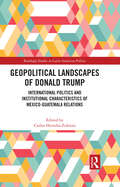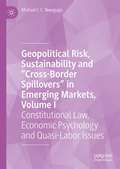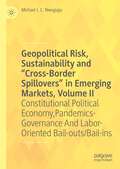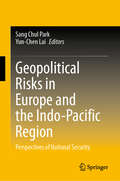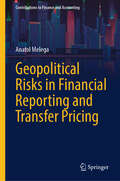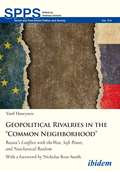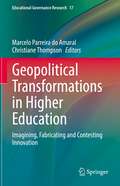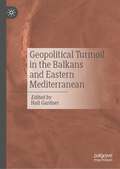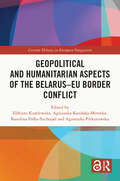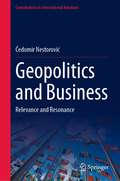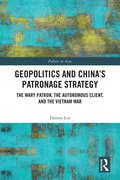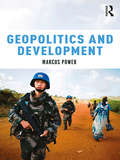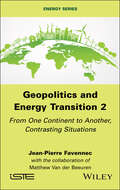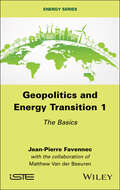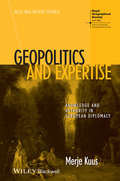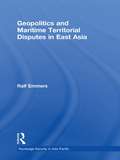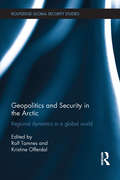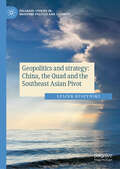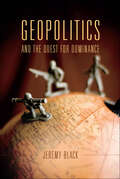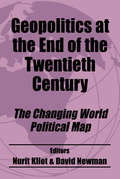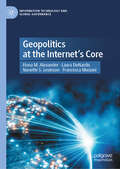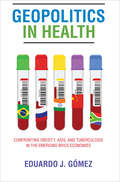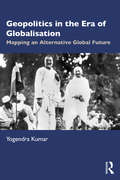- Table View
- List View
Geopolitical Landscapes of Donald Trump: International Politics and Institutional Characteristics of Mexico-Guatemala Relations (Routledge Studies in Latin American Politics)
by Carlos Heredia-ZubietaGeopolitical Landscapes of Donald Trump examines the role that local actors in Mexico, Central America and the United States have played in shaping the Mexico-Guatemala transborder region. From governments to business and organized crime, scholars from both Mexico and the United States introduce a sophisticated approach beyond diplomatic communiqués to tell the story of how Mexico became the wall that Donald Trump promised to build. This is a story of how governments defended their sovereignty in their discourse, only to pave the way for punitive policies that hurt their fellow citizens. The inequalities brought by the extractive economy, the homicides and displacement wrought by the systemic violence, the exodus pushed by environmental degradation and the political crisis generated by economic, political, and military elites need to be addressed to make the transborder region livable for its own population. Geopolitical Landscapes of Donald Trump will be of interest to scholars and students of international relations and Latin American Studies. It will also be of interest to policymakers, practitioners, and general readers who are following US-Mexico and US-Central America relations.
Geopolitical Risk, Sustainability and “Cross-Border Spillovers” in Emerging Markets, Volume I: Constitutional Law, Economic Psychology and Quasi-Labor Issues
by Michael I. NwoguguEconomic recessions, social networks, environmental damage in several large countries (eg. China, Brazil, U.S.), the Global Financial Crisis of 2007-2015 and cross-border spillovers continue to significantly affect economic systems, financial markets, social structures and environmental compliance worldwide. These have rekindled economists’ and policy-makers’ interest in the relationships among constitutions, risk regulation, foreign aid, political systems, government size, credit expansion and sustainable growth. Risk regulation remains highly ineffective as manifested by the failures of new financial regulations and government stimulus programs that were implemented during 2007-2020 in many developed countries and emerging markets countries.This book, the first of two volumes, addresses these issues in the context of the role of constitutional economics and economic psychology as tools for national and global sustainable growth and risk management. Furthermore, this volume analyzes the often symbiotic relationship between alternative sets of legal-institutional-constitutional rules that constrain the choices and activities of economic and political agents on one hand, and sustainable growth, financial regulation and the risk management of financial institutions on the other; and reviews the effects of constitutions and legal institutions on market dynamics (real estate; fixed-income, stocks; etc.) including volatility, market depth and liquidity. This book will help researchers develop better artificial intelligence and decision-systems models of geopolitical risk, public policy and international capital flows, all of which are increasingly relevant to investment managers, boards-of-directors and government officials.
Geopolitical Risk, Sustainability and “Cross-Border Spillovers” in Emerging Markets, Volume II: Constitutional Political Economy, Pandemics-Governance And Labor-Oriented Bail-outs/Bail-ins
by Michael I. NwoguguMany emerging market countries are bank-based economies and are increasingly affected by geopolitical risks, U.S. dollar dynamics, regulations, preferential trade agreements (PTAs), MNCs (that often function like international organizations), social networks, labor dynamics, cross-border spillovers and the inefficient expansion of formal/informal microfinance. Country risks, informal economies (that account for 20-50 percent of the national economy of many emerging market countries), investor protection, enforcement commitment, compliance costs, sustainability (environmental, social, economic and political sustainability), economic growth, political stability, financial stability, geopolitical risk, social networks, household economics, inequality and international trade outcomes can vary dramatically across many DECs and LDECs due to these phenomena. The COVID-19 pandemic has illustrated the many problems inherent in political systems, economic policy and governments’ emergency powers during pandemics/epidemics and economic/financial crisis.This second volume focuses on geopolitical risks that are intertwined with constitutional political economy and labor issues, alongside addressing some of the financial and constitutional crises that occurred in Europe, Asia and the U.S. during 2007-2020. This book provides analysis of complex systems and the preferences and reasoning of state/government and corporate actors in order to develop better artificial intelligence and decision-system models of geopolitical risk, public policy and international capital flows, all of which are increasingly important decision factors for investment managers, boards-of-directors and government officials.
Geopolitical Risks in Europe and the Indo-Pacific Region: Perspectives of National Security
by Sang Chul Park Yun-Chen LaiThis book explores the geo-political risks in Europe and the Indo-Pacific region and interaction between the two regions in the rapidly changing global political landscape. The book explores the reasons for Europe extending its reach and engagement in the Indo-Pacific region, and the Indo-Pacific region increasing its ties with Europe. The book goes on to consider the impact and implications of these engagements on the global order, analyzing cases of potential geopolitical risks brought on by EU-India relations, EU-China relations, EU-Peru-China relations, EU in the Sino-Philippine territorial disputes, and EU’s role in North Korean Nuclear matters. The book would be a valuable read for scholars of international relations and politics, policymakers, and those interested in the interactions between the two regions.
Geopolitical Risks in Financial Reporting and Transfer Pricing (Contributions to Finance and Accounting)
by Anatol MelegaThis book explores the impact of geopolitical changes on financial reporting, transfer pricing, and foreign investment flows. It focuses on how geopolitical instability affects companies in emerging and developing economies, highlighting shifts in international reporting and risk management. The main objectives are to analyze transformations in the internationalization of business, assess the impact of accounting information on investment attraction, and evaluate tax policies. In the context of a changing geopolitical environment and the rise of economic multipolarity, particularly with a focus on BRICS economies, the book addresses the strategic adaptations needed in financial reporting and compliance. Offering an in-depth perspective on the complexity and interconnectedness of today's risks, this book is an essential guide for scholars and financial professionals navigating the global economic landscape.
Geopolitical Rivalries in the “Common Neighborhood”: Russia's Conflict with the West, Soft Power, and Neoclassical Realism (Soviet And Post-soviet Politics And Society Ser. #214)
by Vasif HuseynovThis timely book analyzes ‘soft power’ in the light of neoclassical realist premises as part of the foreign policy toolkit of great powers to expand their sphere of influence. Vasif Huseynov argues that if nuclear-armed great powers compete against the same type of powers to expand or sustain their sphere of influence over a populated region, they use soft power as a major expansive instrument while military power remains a tool to defend themselves and back up their foreign policies. Presenting his model of soft power, the author explores the role of soft power projection by great powers in the formation of the external alignment of regional states. He focuses on the rivalries between Russia and the West (i.e. the EU and the USA) over the states located between the EU and Russia (the region known as the “common [or shared] neighborhood”) and on two of these regional states (Ukraine and Belarus) to test his hypotheses.
Geopolitical Transformations in Higher Education: Imagining, Fabricating and Contesting Innovation (Educational Governance Research #17)
by Christiane Thompson Marcelo Parreira do AmaralThis book discusses the central role education and research play in generating both value and comparative advantages in the (imageries of) global competition, competitiveness and transnational value chains. They are seen as assets placed at the forefront of developments that are arguably reshaping individuals, society and economy. This edited volume explores these developments in terms of changing relations between society, economy, science and individuals. The idea that we live in global knowledge societies and knowledge-based economies or that present-day productive systems constitute an industry 4.0 have gained currency as descriptions of contemporary society that are said to bear direct and indirect consequences for political, economic, and social orders. In this context, innovation, science and education are central themes in contemporary discussions about the future of modern societies. Innovation is enthusiastically embraced as the panacea for all sorts of societal issues of our times; science is equally deemed to play a decisive role in solving current problems and in heralding a bright future with more wealth and more welfare for all citizens; education is conferred the task to producing individuals equipped with both skills and competences considered key to innovation but also displaying the attitudes and dispositions that will secure continuous innovation and economic growth.
Geopolitical Turmoil in the Balkans and Eastern Mediterranean
by Hall GardnerThis edited book will examine the Balkans and Eastern Mediterranean from multidimensional geo-strategic, political-economic, socio-cultural/religious and demographic perspectives. It analyzes the conflicting geopolitical interests of the major and regional powers, as well as those of NATO and the European Union, with a focus on energy, democracy and corruption, shifts in population, as well as religious political influence. The authors argue that the US, NATO and EU leaderships can no longer afford to ignore the two regions — if the increasing potential for conflict is to be averted. The Balkans and Eastern Mediterranean are returning to a major position in the contemporary geostrategic nexus since NATO began a new expansion into the Balkans by bringing Montenegro in 2017 and North Macedonia in March 2020 into membership, after its previous expansion to Slovenia in NATO’s “Big Bang” in 2004 and to both Albania and Croatia in 2009.
Geopolitical and Humanitarian Aspects of the Belarus–EU Border Conflict (Current Debates in European Integration)
by Agnieszka Kasińska-Metryka Karolina Pałka-Suchojad Elżbieta Kużelewska Agnieszka PiekutowskaThis book provides a broad geopolitical and legal analysis of the longer-term dispute between the Belarusian regime and the European Union, played out through conflict on the Polish–Belarusian border, which started in 2021.Although Poland finds itself at the center of this conflict, the book covers all countries whose territorial integrity has been affected, revealing a Belarusian regime taking advantage of the refugee crisis as a tool of hybrid warfare for destabilizing the political situation. As such, it also examines the role of Russia and its influence by means of its Belarusian neighbor, exposing the underlying motivations and mechanisms used by the Lukashenko regime towards the European community.This book will be of key interest to scholars and students of Central and Eastern European politics, EU politics, migration politics/studies, global governance, human rights, crisis management and, more broadly, to international relations, security studies, and international law.Chapter 5 of this book is freely available as a downloadable Open Access PDF at www.taylorfrancis.com, has been made available under a Creative Commons Attribution-Non-Commercial-No Derivative Licence (CC-BY-NC-ND) 4.0 license.
Geopolitics and Business: Relevance and Resonance (Contributions to International Relations)
by Čedomir NestorovićThis book sheds light on the intricate relationship between geopolitics and business and the essential interdependence between corporations and geopolitics. Despite apparent animosity, practical solutions and theories proposed by geopolitics find resonance within the business world, and vice versa. Concepts like critical theory, disruption, hegemony, strategic rivalry, and cost-effectiveness hold common ground in both realms, even though they have historically been disregarded.Geopolitical authors have often overlooked the vital role played by businesses in shaping global affairs, while businesses themselves view geopolitics as a risk to be managed. These contrasting viewpoints have given rise to misunderstandings and misconceptions between the two spheres.The author sets out to bridge the gap between geopolitics and business, exploring how corporations perceive space, state, and power, while also analyzing the influence of classical, critical, and feminist geopolitics on business strategies. This comprehensive analysis reveals that businesses are not mere non-state agents among many, but indeed, the principal non-state agents in geopolitics. The book is an essential read for scholars, researchers, and professionals seeking a deeper understanding of the dynamic interplay between these critical forces.
Geopolitics and China's Patronage Strategy: The Wary Patron, the Autonomous Client, and the Vietnam War (Politics in Asia)
by Dalton LinThis book highlights how resource constraints and client agency impact China’s patronage policy in their pursuit of regional geopolitical power. By combining for the first time the limit of great power patrons’ resources and the agency of client countries, this book accentuates that the costs and uncertainty require China to be a wary patron who must adjust its patronage priorities in order to deal with geopolitical competition. Using China’s patronage delivery to North Vietnam during the fierce and geopolitically competitive period of the Vietnam War, the book underscores that neighboring countries’ domestic political dynamics, which are out of Beijing’s control, drive costs and uncertainty, thus constraining Beijing’s choices.With a wealth of historical materials, including minutes of Chinese decision-makers’ conversations with foreign counterparts; selections of Chinese leaders’ manuscripts; chronologies of their diplomatic, economic, and military activities; senior Chinese officials’ memoirs and biographies; and declassified Chinese official documents, this book will be of interest to students and scholars of Chinese politics, history, and international relations.
Geopolitics and Development
by Marcus PowerGeopolitics and Development examines the historical emergence of development as a form of governmentality, from the end of empire to the Cold War and the War on Terror. It illustrates the various ways in which the meanings and relations of development as a discourse, an apparatus and an aspiration, have been geopolitically imagined and enframed. The book traces some of the multiple historical associations between development and diplomacy and seeks to underline the centrality of questions of territory, security, statehood and sovereignty to the pursuit of development, along with its enrolment in various (b)ordering practices. In making a case for greater attention to the evolving nexus between geopolitics and development and with particular reference to Africa, the book explores the historical and contemporary geopolitics of foreign aid, the interconnections between development and counterinsurgency, the role of the state and social movements in (re)imagining development, the rise of (re)emerging donors like China, India and Brazil, and the growing significance of South–South flows of investment, trade and development cooperation. Drawing on post-colonial and postdevelopment approaches and on some of the author’s own original empirical research, this is an essential, critical and interdisciplinary analysis of the complex and dynamic political geographies of global development. Primarily intended for scholars and post-graduate students in development studies, human geography, African studies and international relations, this book provides an engaging, invaluable and up-to-date resource for making sense of the complex entanglement between geopolitics and development, past and present.
Geopolitics and Energy Transition 2: From One Continent to Another, Contrasting Situations (ISTE Invoiced)
by Jean-Pierre FavennecThe energy sector is undergoing unprecedented change. Twenty years ago, the main concern was having enough oil and gas, whereas today, political leaders are faced with the need to reduce the CO2 emissions produced by still-dominant fossil fuels, without being able to totally rely on renewable energies, which are intermittent and whose share in energy production remains low. Geopolitics and Energy Transition 2 examines the energy sector and the state of energy transition continent by continent. North America is rich in resources, while the situation is mixed in South America. Europe advocates transition but remains dependent on imported fossil fuels. The CIS has enormous resources at its disposal and uses them as political weapons. Access to energy is a priority for Africa. Asia is faced with growing energy needs and pollution, which should accelerate energy transition. The Middle East, a champion of hydrocarbons, is launching into solar energy.
Geopolitics and Energy Transition, Volume 1: The Basics
by Jean-Pierre FavennecThe energy sector is undergoing unprecedented change. Twenty years ago, the main concern was having enough oil and gas, whereas today, political leaders are faced with the need to reduce the CO2 emissions produced by still-dominant fossil fuels, without being able to totally rely on renewable energies, which are intermittent and whose share in energy production remains low. Geopolitics and Energy Transition 1 presents the technical aspects of energy and its main characteristics, and outlines the challenges of the energy transition, the conditions for the development of renewable energies and the geopolitical stakes of this transition. It also describes the various energy markets and the consequences of liberalization policies, not forgetting to analyze the structures of the different sectors, while pointing out the fundamental problems of supply security and ways of strengthening it.
Geopolitics and Expertise: Knowledge and Authority in European Diplomacy (RGS-IBG Book Series)
by Merje KuusGeopolitics and Expertise is an in-depth exploration of how expert knowledge is created and exercised in the external relations machinery of the European Union. Provides a rare, full-length work on transnational diplomatic practice Based on a rigorous and empirical study, involving over 100 interviews with policy professionals over seven years Focuses on the qualitative and contextual, rather than the quantitative and uniform Moves beyond traditional political science to blend human geography, international relations, anthropology, and sociology
Geopolitics and Maritime Territorial Disputes in East Asia (Routledge Security in Asia Pacific Series)
by Ralf EmmersGeopolitics is a crucial element in understanding international relations in East Asia, with major and medium powers competing for influence. This book examines geopolitics in East Asia, focusing in particular on its major, contentious maritime territorial disputes. It looks in particular detail at the overlapping claims between Japan, China and Taiwan over the Senkaku/Diao yu Islands in the East China Sea as well as the Paracel Islands claimed by China, Taiwan, and Vietnam and the Spratly Islands involving Brunei, China, Malaysia, the Philippines, Taiwan, and Vietnam in the South China Sea. The book offers a comparative study of the East and South China Seas by arguing that their respective circumstances are influenced by similar geopolitical considerations; factors such as territory, natural resources and power competition all impact on disputes and broader regional relations. It is precisely the interplay of these geopolitical forces that can lead to the rapid escalation of a maritime territorial dispute or reversely to a diffusion of tensions. The book considers how such disputes might be managed and resolved peacefully, despite the geopolitical conditions that can make co-operation on these issues difficult to achieve. Ralf Emmers examines the prospect for conflict management and resolution by identifying catalysts which may contribute to improving the climate of relations.
Geopolitics and Security in the Arctic: Regional dynamics in a global world (Routledge Global Security Studies)
by Rolf Tamnes Kristine OfferdalWritten by a group of leading experts on Artic affairs, this book offers a historically informed and comprehensive study of the geopolitics and security challenges of the Arctic. The key aim of the work is to identify the conditions for cooperation, stability and peace in the Arctic and to reach beyond simple description and expectation in order to explore in depth some of the main factors that will determine the future of international relations in the region. Furthermore, it addresses key topics such as the geopolitical significance of the Arctic and the importance of oil and gas resources in the Arctic. The book also investigates what the main characteristics of governance in the Arctic are, and how institutions and regimes can promote stability and security in the region. The volume maintains two layers of focus. The first relates to the dynamics within the Arctic and the second to developments outside the region, highlighting that we cannot understand the Arctic in isolation from global developments such as energy markets, security conflicts and NATO-Russian antagonism. This book will be of much interest to students of Arctic politics, security studies, geopolitics, Russian and Scandinavian politics, and international relations in general.
Geopolitics and strategy: China, the Quad and the Southeast Asian Pivot (Palgrave Studies in Maritime Politics and Security)
by Leszek BuszynskiChina seeks geopolitical space in the Western Pacific . The spearhead of China's expansion is the navy which is now the world's largest with an expanding carrier force to enforce its maritime claims in the South China Sea and elsewhere. The geopolitical pivot for China is Southeast Asia. In view of China's constricted maritime geography, Southeast Asia is the one place that can provide access for its expanding navy allowing China to expand in different directions. Control of this region would deprive the US of a positional advantage in the Western Pacific, It would divide the Indo Pacific into two sections, the Indian Ocean and the Western Pacific., separating Japan from India and nullifying the Quad grouping which brought together the US, Japan, Australia and India to counter Chinese expansionism. Because of its strategic value, Southeast Asia has become a key region in the rivalry between China and the US with its partners in the Quad. However, Southeast Asia is a region of great diversity and some countries would side with China while others would resist it. Whether China can achieve control of this region is of great concern to the US and the Quad as it relates to Chinese long term ambitions and its challenge not just to the region but to the global order.
Geopolitics and the Anglophone Novel, 1890-2011
by John MarxLiterary fiction is a powerful cultural tool for criticizing governments and for imagining how better governance and better states would work. Combining political theory with strong readings of a vast range of novels, John Marx shows that fiction over the long twentieth century has often envisioned good government not in Utopian but in pragmatic terms. Early-twentieth-century novels by Joseph Conrad, E. M. Forster and Rabindrananth Tagore helped forecast world government after European imperialism. Twenty-first-century novelists such as Monica Ali, Chimamanda Ngozi Adichie, Michael Ondaatje and Amitav Ghosh have inherited that legacy and continue to criticize existing policies in order to formulate best practices on a global scale. Marx shows how literature can make an important contribution to political and social sciences by creating a space to imagine and experiment with social organization.
Geopolitics and the Great Powers in the 21st Century: Multipolarity and the Revolution in Strategic Perspective (Geopolitical Theory)
by C. Dale WaltonThis book argues that in the twenty-first century Eastern Eurasia will replace Europe as the theatre of decision in international affairs, and that this new geographic and cultural context will have a strong influence on the future of world affairs. For half a millennium, the great powers have practised what might be called ‘world politics’, yet during that time Europe, and small portions of the Near East and North Africa strategically vital to Europe, were the ‘centres of gravity’ in international politics. This book argues that the ‘unipolar moment’ of the post-Cold War era will not be replaced by a US-China ‘Cold War’, but rather by a long period of multipolarity in the twenty-first century. Examining the policy goals and possible military-political strategies of several powers, this study explains how Washington may play a key role in eastern Eurasian affairs if it can learn to operate in a very different political context. Dale Walton also considers the rapid pace of technological change and how it will impact on great power politics. Considering India, China, the US, Russia, Japan, and other countries as part of a multipolar system, he addresses the central questions that will drive US policy in the coming decades. Geopolitics and the Great Powers in the 21st Century will be of interest to students of international security, military history, geopolitics, and international relations.
Geopolitics and the Quest for Dominance
by Jeremy BlackHistory and geography delineate the operation of power, not only its range but also the capacity to plan and the ability to implement. Approaching state strategy and policy from the spatial angle, Jeremy Black argues that just as the perception of power is central to issues of power, so place, and its constraints and relationships, is partly a matter of perception, not merely map coordinates. Geopolitics, he maintains, is as much about ideas and perception as it is about the actual spatial dimensions of power. Black's study ranges widely, examining geography and the spatial nature of state power from the 15th century to the present day. He considers the rise of British power, geopolitics and the age of Imperialism, the Nazis and World War II, and the Cold War, and he looks at the key theorists of the latter 20th century, including Henry Kissinger, Francis Fukuyama and Samuel P. Huntington, Philip Bobbitt, Niall Ferguson, and others.
Geopolitics at the End of the Twentieth Century: The Changing World Political Map (Routledge Studies in Geopolitics #No. 2)
by David Newman Nurit KliotAn excellent examination of how the collapse of the Soviet Union and the impact of globalization have brought about changes not only to the territorial configuration sovereignty of states and their boundaries, but also to traditional notions of state, boundaries, sovereignty and social order These essays focus on the key regional and geopolitical characteristics of this global reordering, with an emphasis on Eastern Europe and South Asia. They discuss the territorial reordering which is taking place at the level of the state as boundaries are redemarcated in line with ethno-territoral demands; as borders are transversed by the movement of peoples, information and finance; and as the lines of territorial demarcation are perceived not only in terms of their fixed characteristics but as part of a process through which regional and ethnic identities continue to be formed and reformed. Each section ends with articles which focus on literature on geopolitics and boundaries. This is an invaluable addition to our understanding of contemporary world affairs.
Geopolitics at the Internet’s Core (Information Technology and Global Governance)
by Laura DeNardis Francesca Musiani Nanette S. Levinson Fiona M. AlexanderContentious geopolitical conflicts over digital technologies have arisen around a complex set of technical specifications at the Internet&’s core. One of these is the Internet Protocol (IP), designed for addressing and routing information to its destination. China redesigning the Internet? Ukraine asking that Russia be disconnected from the Internet? The U.S. &‘surrendering&’ the Internet? The Internet Protocol - rightly or not - has been at the center of many digital policy concerns for decades. In examining entanglements between IP and public interest issues, Geopolitics at the Internet&’s Core illuminates how technical infrastructure is now a proxy for political and economic power. Ongoing global controversies over the Internet Protocol ecosystem hint at its importance and why IP is a flashpoint mediating broader conflicts in various cultural and historic contexts. Geopolitics at the Internet&’s Core analyzes the trajectory and possible futures of the Internet Protocol as a space mediating geopolitical and domestic controversies in an increasingly contentious digital world; it explains the IP ecosystem, a complex combination of virtual resources, abstract specifications, tangible infrastructure, functionally specific systems, and the institutions and rules that design and govern these systems. With a view toward the future and insights into the governance of emerging technologies, this book identifies eight IP-related levers of power that illuminate technology governance debates. Opening up the black box of the Internet Protocol and related global governance challenges, it explains the political battles and the stakes of these battles at the heart of the Internet.
Geopolitics in Health: Confronting Obesity, AIDS, and Tuberculosis in the Emerging BRICS Economies
by Eduardo J. GómezAn in-depth analysis of why leaders from the BRICS respond to public health emergencies the way they do.In recent years, political leaders in Brazil, Russia, India, China, and South Africa, collectively known as the BRICS, have worked to reformulate international discussions and policies on issues ranging from fair and free trade to human rights. When it comes to health epidemics, however, the BRICS have differed greatly in terms of how—and when—they respond, highlighting important differences in their political commitment to meeting healthcare needs.In Geopolitics in Health, Eduardo J. Gómez takes a critical look at how the emerging BRICS economies dealt with the obesity, AIDS, and tuberculosis epidemics. Despite the countries having similar international political and economic ambitions, Gómez finds that domestic policy responses were driven mainly by international, as opposed to domestic, pressures and interests. Using a theoretical framework called geopolitical positioning, Gómez explores how nations respond to international pressures and policy criticisms, as well as offers of financial and technical assistance; countries then utilize domestic policy innovations and ultimately engage in global health diplomacy in order to bolster their international reputation.Gómez draws on extensive data and case studies and argues that leaders aspiring to build their reputations among elite nations have a ready way to demonstrate their status through quick and effective public health responses; those who scorn the international community tend to react slowly and ineffectively to the same type of crises. The first book of its kind to conduct an in-depth comparative historical analysis of how the BRICS deal with public health threats, this pathbreaking text demonstrates the value of positive geopolitical positioning and strong partnerships with other governments, nongovernmental organizations, and social health movements.
Geopolitics in the Era of Globalisation: Mapping an Alternative Global Future
by Yogendra KumarThis book presents an alternative roadmap for a world characterised by geopolitical uncertainty. The surging expectations about a future world of democratic values and high economic growth, born out of superpower bonhomie at the end of the Cold War, did not lead to the promised outcomes. Instead we are faced with deeply destabilising challenges, like climate change, widespread state fragility, terrorism, arms race, disruptive newer technologies, global economic volatility, and ineffectiveness of multilateral institutions, old and new. The volume: surveys the intellectual discourse, the attempts to redesign the global institutions, and the geopolitical trends since the end of the Cold War for an understanding of the contemporary geopolitics, analyses the characteristics of the contemporary geopolitics, the seeming intractability of the global challenges, and the ongoing discourse about preventing their further deterioration, foregrounds the Gandhian praxis and IR theory for managing power transitions anchored in non-violent mobilisation of empowered masses, ensuring institutional resilience, and illustrates them through ongoing conflicts in Iraq and Afghanistan, outlines an approach, based on the Gandhian experience of managing political change, towards conflict, geopolitical uncertainties, and institutional ineffectiveness for securing a better future globally, including South Asia. Accessibly written, this volume will be indispensable for foreign policy experts, government think tanks, and career bureaucrats. It will also be essential for scholars and researchers of international relations, foreign policy, politics, and governance and public policy.
